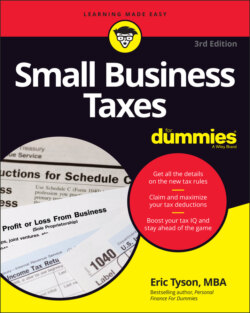Читать книгу Small Business Taxes For Dummies - Eric Tyson - Страница 27
Noting 20 percent deduction for pass-through entities
ОглавлениеIn redesigning the tax code, Congress rightfully realized that the many small businesses that operate as so-called pass-through entities would be subjected to higher federal income tax rates compared with the new 21 percent corporate income tax rate. Pass-through entities are small business entities such as sole proprietorships, LLCs, partnerships, and S corporations and are so named because the profits of the business pass through to the owners and their personal income tax returns.
To address the concern that individual business owners who operated their business as a pass-through entity could end up paying a higher tax rate than the 21 percent rate levied on C-corporations, Congress provided a 20 percent deduction for those businesses. So, for example, if your sole proprietorship netted you $65,000 in 2022 as a single taxpayer, that would push you into the 22 percent federal income tax bracket. But you get to deduct 20 percent of that $65,000 of income (or $13,000) for the pass-through deduction so you would only owe federal income tax on the remaining $52,000 ($65,000 – $13,000).
Another way to look at this is that the business would only pay taxes on 80 percent of its profits and would be in the 22 percent federal income tax bracket. This deduction effectively reduces the 22 percent tax bracket to 17.6 percent.
This is a major change that not surprisingly has made small business owners exceedingly optimistic about being able to grow their businesses. In fact, in a survey of small business owners conducted by the nonprofit National Federation of Independent Business just after the tax bill was passed and signed into law, a record percentage of those surveyed (covering the survey’s 45-year history) expressed optimism about it being a good time to expand their businesses.
This 20 percent pass-through deduction gets phased out for service business owners (such as lawyers, doctors, real estate agents, consultants, and so on) at single taxpayer incomes above $170,050 (up to $220,050) and for married couples filing jointly incomes that exceed $340,100 (up to $440,100). For other types of businesses above these income thresholds (for tax year 2022), this deduction may be limited so consult with your tax advisor.
